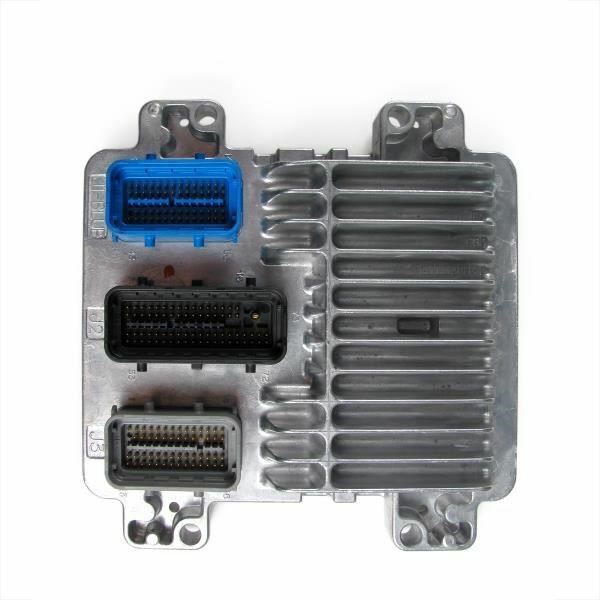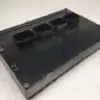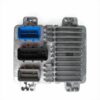Restore Peak Performance to Your 2006 Buick Rainier
Is your 2006 Buick Rainier or other compatible GM vehicle suffering from perplexing issues like poor fuel economy, erratic shifting, a persistent check engine light, or even a no-start condition? The Powertrain Control Module (PCM), often called the engine computer, is the central nervous system of your vehicle’s engine and transmission. When it begins to fail, it can cause a wide range of frustrating and difficult-to-diagnose problems. This replacement PCM, part number 12606399, is the definitive solution to restore your vehicle’s original performance, reliability, and efficiency.
As the command center for your powertrain, the PCM processes data from dozens of sensors to make thousands of calculations every second. It controls critical functions like fuel injection timing, ignition spark, transmission shift points, and emissions systems. Over time, factors like heat, vibration, and electrical surges can degrade internal components, leading to intermittent or total failure. Replacing a faulty module is not just about fixing a problem; it’s about ensuring the longevity and proper operation of your entire powertrain.
From the Diagnostic Bay
We had a 2006 Trailblazer (which uses the same platform as the Rainier) come into the shop with a complaint of a random, harsh 1-2 shift and an intermittent stall at idle. The owner had already replaced the throttle body and a couple of sensors based on forum advice, but the problem persisted. We hooked up our professional scan tool and saw no specific transmission codes, but we did notice erratic data coming from the PCM’s outputs. Instead of continuing to replace parts, we swapped in a known-good, programmed PCM. The harsh shift vanished, and the idle stabilized immediately. It’s a classic case where the root cause was the computer itself, not the components it was controlling. A faulty PCM can send you on a wild goose chase, costing you time and money on unnecessary parts.
Symptoms of a Failing Powertrain Control Module
A failing PCM can manifest in numerous ways. If you’re experiencing any of the following, your engine computer could be the culprit:
- ✔ Check Engine Light (CEL) is illuminated with various communication or sensor-related codes (e.g., U-codes, P0601-P0606).
- ✔ Your vehicle fails to start or starts intermittently.
- ✔ Noticeable decrease in fuel efficiency.
- ✔ Rough or unstable idling.
- ✔ Engine stalling, stuttering, or misfiring.
- ✔ Harsh or erratic automatic transmission shifting.
- ✔ The cooling fans run constantly or not at all.
- ✔ Loss of communication with your OBD-II scan tool.
Why Choose Our Pre-Programmed 2006 Rainier PCM?
Getting your vehicle back on the road shouldn’t be a complicated ordeal. Our service is designed to be a straightforward, effective solution. Unlike a generic module from a parts store or salvage yard, this unit is specifically prepared for your vehicle. We take your vehicle’s unique Vehicle Identification Number (VIN) and flash the module with the latest, most stable software updates directly from GM. This critical step ensures that the computer has the correct calibrations for your engine, transmission, and specific options package. This process corrects factory bugs, improves performance, and ensures seamless communication between all of your vehicle’s electronic systems.
This is a true plug-and-play solution. Once you receive the module, the primary installation is straightforward. In most cases, after installation, you will only need to perform a simple security relearn procedure (often called a CASE relearn or anti-theft relearn), which can be done without special tools. We provide clear instructions to guide you through this final step, getting you back on the road quickly and without the need for an expensive trip to the dealership.
This PCM is a direct replacement for a wide range of original part numbers, including: 12569773, 12588650, 12589311, 12589585, 12591647, 12591648, 12593531, 12593532, 12594430, 12594431, 12596783, 12596784, 12597521, 12597776, 12597777, 12600818, 12604438, 12604439, 12606369, 12606373, 12606374, 12606398, 12606399, 19209820, and 19209821. It is compatible with a variety of 2004-2006 GM models, including the Buick Rainier, Chevy Trailblazer, GMC Envoy, Chevy Colorado, GMC Canyon, Hummer H3, Isuzu Ascender, and Saab 9-7X. Please verify the fitment list to ensure compatibility with your specific vehicle.
Frequently Asked Questions
Do I need to send you my old computer?
No, there is no core charge or requirement to send your old module back to us. This is an outright purchase, simplifying the process for you.
What is VIN programming and why is it necessary?
VIN programming involves loading your vehicle’s specific software and calibrations onto the PCM. Every vehicle has a unique configuration based on its engine, transmission, and options. This programming ensures the PCM works perfectly with your vehicle, preventing compatibility issues, error codes, and performance problems. We handle this for you before shipping.
Is this part difficult to install?
The physical installation is typically straightforward for someone with basic mechanical skills. The PCM is usually located in the engine bay and is held in place by a few bolts and has several electrical connectors. The most important step after installation is the security relearn procedure, which syncs the new PCM with your vehicle’s anti-theft system. We provide instructions for this procedure.
Will this fix my specific problem?
This PCM is a direct solution for a failed module. While the symptoms listed are common indicators of PCM failure, it’s always best to have a proper diagnosis performed by a qualified mechanic. A faulty PCM can mimic other issues, such as bad sensors or wiring problems. This part will resolve issues directly caused by a faulty computer.
What information do you need from me?
After you complete your purchase, we will need you to provide your 17-digit Vehicle Identification Number (VIN). You can typically find this on your vehicle’s dashboard (visible through the windshield), on the driver’s side door jamb sticker, or on your vehicle’s registration and insurance documents.


